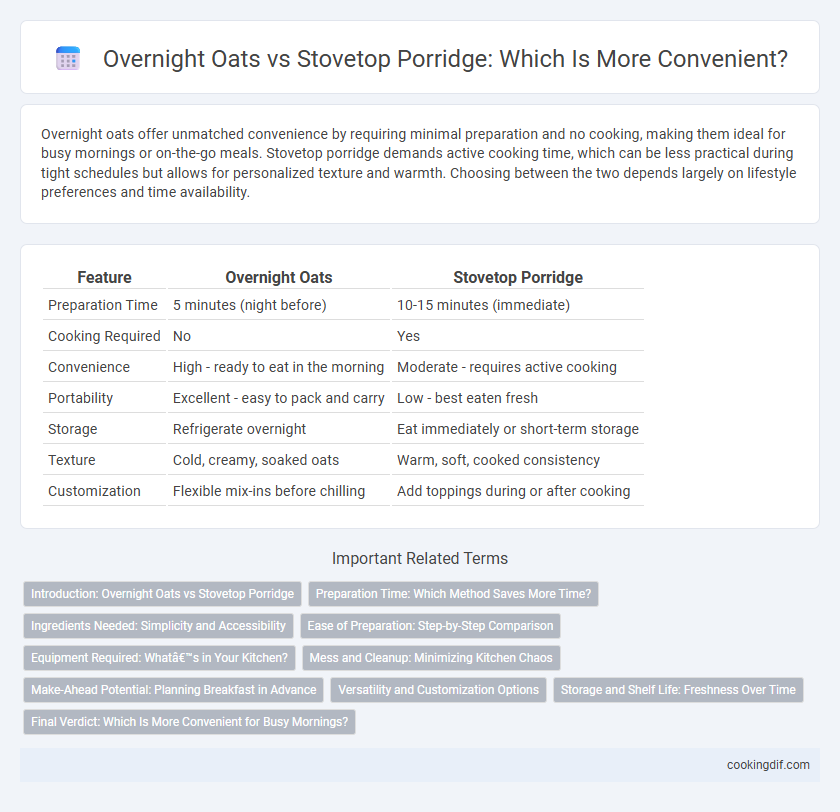Overnight oats offer unmatched convenience by requiring minimal preparation and no cooking, making them ideal for busy mornings or on-the-go meals. Stovetop porridge demands active cooking time, which can be less practical during tight schedules but allows for personalized texture and warmth. Choosing between the two depends largely on lifestyle preferences and time availability.
Table of Comparison
| Feature | Overnight Oats | Stovetop Porridge |
|---|---|---|
| Preparation Time | 5 minutes (night before) | 10-15 minutes (immediate) |
| Cooking Required | No | Yes |
| Convenience | High - ready to eat in the morning | Moderate - requires active cooking |
| Portability | Excellent - easy to pack and carry | Low - best eaten fresh |
| Storage | Refrigerate overnight | Eat immediately or short-term storage |
| Texture | Cold, creamy, soaked oats | Warm, soft, cooked consistency |
| Customization | Flexible mix-ins before chilling | Add toppings during or after cooking |
Introduction: Overnight Oats vs Stovetop Porridge
Overnight oats offer unparalleled convenience by requiring minimal preparation time, as oats soak in liquid overnight for a ready-to-eat breakfast. Stovetop porridge demands active cooking, typically taking 5 to 10 minutes to achieve creamy consistency. For busy mornings, overnight oats provide a hassle-free option while stovetop porridge allows customization with texture and warmth.
Preparation Time: Which Method Saves More Time?
Overnight oats require minimal active preparation time, as ingredients are combined and left to soak in the refrigerator overnight, saving valuable morning hours. Stovetop porridge demands continuous attention and cooking time, typically around 5 to 10 minutes, extending the total preparation period. For time-conscious individuals, overnight oats offer a more efficient and convenient breakfast option by eliminating the need for morning cooking.
Ingredients Needed: Simplicity and Accessibility
Overnight oats require only basic ingredients like rolled oats, milk, and a sweetener, making them simple and accessible for quick preparation without cooking. Stovetop porridge often demands additional ingredients such as water, milk, salt, and sometimes butter or spices, requiring more kitchen tools and active cooking time. Choosing overnight oats enhances convenience through minimal ingredient use and easy refrigeration, ideal for busy mornings.
Ease of Preparation: Step-by-Step Comparison
Overnight oats require minimal preparation, simply combining oats, milk, and desired toppings the night before and allowing them to soak in the refrigerator. Stovetop porridge demands active cooking, involving simmering oats with liquid on the stove, which typically takes around 5 to 10 minutes depending on the type of oats used. For those prioritizing ease of preparation, overnight oats offer a hands-off, time-saving solution, whereas stovetop porridge provides a warm, customizable breakfast with slightly more effort.
Equipment Required: What’s in Your Kitchen?
Overnight oats require minimal equipment, typically just a jar or bowl and a refrigerator, making them highly convenient for those with limited kitchen tools. Stovetop porridge demands a pot and a stove, which can be less accessible for individuals without a fully equipped kitchen. Choosing overnight oats streamlines preparation and cleanup, ideal for busy lifestyles or small kitchens.
Mess and Cleanup: Minimizing Kitchen Chaos
Overnight oats require minimal cleanup, as ingredients combine in a single container and no cooking utensils are involved, reducing mess and kitchen chaos. Stovetop porridge often demands multiple pots and stirring utensils, leading to more dishes and potential spills. Choosing overnight oats streamlines preparation and cleanup, ideal for busy mornings.
Make-Ahead Potential: Planning Breakfast in Advance
Overnight oats offer superior make-ahead potential, allowing busy individuals to prepare a nutritious breakfast hours or even days in advance with minimal effort. Stovetop porridge, while flavorful and customizable, requires immediate cooking and limits planning flexibility for rushed mornings. Choosing overnight oats enhances convenience by minimizing morning preparation time and supporting efficient meal planning.
Versatility and Customization Options
Overnight oats offer unmatched convenience through effortless preparation and a wide range of customization options, allowing ingredients like chia seeds, fruits, and various milk types to be mixed and refrigerated for ready-to-eat meals. Stovetop porridge provides versatile texture control, enabling adjustments in cooking time and liquid ratios, making it ideal for those who prefer hot, creamy consistency with customizable toppings like nuts, spices, and sweeteners. Both options support dietary preferences and ingredient flexibility but cater to distinct preferences in preparation time and meal temperature.
Storage and Shelf Life: Freshness Over Time
Overnight oats offer superior convenience with extended storage, as they can be refrigerated for up to five days while maintaining freshness and texture. Stovetop porridge, typically best consumed immediately, has a shorter shelf life and often requires reheating, which can affect creaminess and flavor. For those seeking meal prep ease and prolonged freshness, overnight oats provide a practical solution without sacrificing taste.
Final Verdict: Which Is More Convenient for Busy Mornings?
Overnight oats require minimal morning effort, as they are prepared the night before and eaten cold or quickly warmed, making them ideal for busy schedules. Stovetop porridge cooks in about 5-10 minutes but demands active attention during preparation, which may not suit rushed mornings. For maximum convenience, overnight oats are the preferred choice due to their effortless and time-saving nature.
Overnight oats vs stovetop porridge for convenience Infographic

 cookingdif.com
cookingdif.com